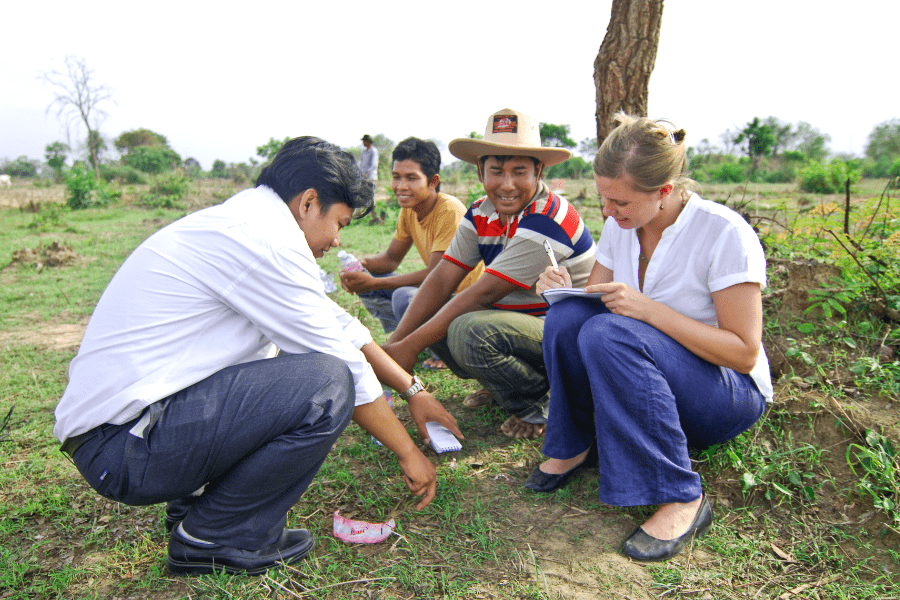
Centering Equity in Sustainability
By KellyAnn Tsai
When it comes to the topic of sustainability, many people tend to think of issues like recycling, deforestation and climate change. But few may realize that broader social issues of language, culture, and equity are central to addressing the world’s most pressing sustainability challenges.
This tendency to view sustainability from a purely environmental perspective is something that Alexandra Hiniker, director of The Sustainability Initiative at Carnegie Mellon University, challenged when teaching her mini course Local Advocacy for Global Change.
“When I said ‘sustainability,’ a lot of students initially focused on the environment, recycling or similar issues. They didn't consider how their work could impact the broader community,” she said.
According to Hiniker, community and equity are at the core of sustainability. In her interdisciplinary course, jointly offered by the Department of Modern Languages and the School of Design, she guides students to center equity while identifying links between environmental, social and economic justice and strategizing solutions to issues both at home and around the world.
Hiniker’s approach to sustainability is informed by 15 years of experience working across the globe: she has led humanitarian disarmament initiatives in some of the world’s most bombed and mined countries, advocated for locally-led peacebuilding and civilian protection processes at the United Nations in New York, and implemented pandemic preparedness projects in Africa, Asia and Eastern Europe. She also served in the New York City Mayor’s Office for International Affairs.
Through her work as CMU’s director of The Sustainability Initiative, housed in Libraries, Hiniker leads the university’s annual Voluntary University Review (VUR). The VUR assesses Carnegie Mellon’s engagement with the United Nations Global Goals, a set of 17 global objectives linking environmental, social and economic issues. In this process, Hiniker has identified courses in the Department of Modern Languages as the largest contributor to CMU’s progress toward meeting Global Goal 10: Reduced Inequalities.
“What's so interesting about the courses in the Department of Modern Languages is that they're talking about cultural issues and issues of equity. That, to me, is at the foundation of how we're going to figure out the solutions to these really big challenges,” she said. “By understanding how everyone is impacted, how we can work together, how we learn, understand and respect each other to address these problems — that is how we're going to solve them.”
Courses in the Department of Modern Languages approach the goal of reducing inequalities in diverse ways. Some courses provide students opportunities to learn an additional language, equipping them to communicate with those who do not speak English as a primary language. Other courses such as “Introduction to Hispanic Literary and Cultural Studies,” “Cultural Complexities” and “Beyond the Mafia and Michelangelo” explore diverse cultures and challenge stereotypes, allowing students to engage more deeply with the surrounding world. A common theme throughout all courses is a commitment to developing engaged and informed global citizens.
“When students enroll in a Modern Languages course, they are learning how people from different backgrounds think, how cultural norms may differ around the world, and how to approach and solve novel challenges,” said Anne Lambright, Paul Mellon professor of Hispanic studies and head of the Department of Modern Languages. “We’re proud to offer students an abundance of opportunities to develop the global awareness and critical skills that prepare them to tackle important global challenges.”
Hiniker believes that teaching students to engage with multicultural communities and advocate for change is critical for making concrete progress towards the Global Goals. But, she cautions, it is also important to remember that change requires work from all sides: “When people say the youth are our hope, it can imply that they are abdicating their own responsibility to make the world more sustainable for all, so it's important to push back and say we all have a role,” she said.
To that end, Hiniker is developing resources that can help faculty and instructors foster equity-focused discussions in their courses in ways that are meaningful for their particular area of expertise. She will also teach another Local Advocacy for Global Change mini-2 course in fall 2023. She is dedicated to identifying opportunities to encourage discussions around equity among students, faculty and staff at CMU, both inside and outside the classroom. She will continue to create opportunities for the CMU community to engage with the international community, such as the conversation she recently held with Costa Rica’s first woman to serve as Ambassador to the United Nations.
“Collectively we know a lot, but we can all do better when it comes to learning from each other.”